Contract Law Analysis: Berry v. Blaire Case Study Report
VerifiedAdded on 2020/04/21
|6
|1995
|153
Report
AI Summary
This report provides a comprehensive analysis of a contract law case, specifically focusing on the principles of offer, acceptance, and consideration within the context of Berry v. Blaire. The analysis delves into the objective theory of assent, exploring whether statements made in jest can form a binding contract, referencing the Lucy v. Zehmer case. It examines the concept of unilateral contracts, drawing parallels with the Carlill v. Carbolic Smoke Ball Co. case, and assesses whether the actions of the parties demonstrated a legal intention to be bound. The report also considers the role of consideration, particularly in the context of employer-initiated prizes, and determines the enforceability of the contract based on the actions and statements of the parties involved. The analysis references various legal precedents and principles to support its conclusions, ultimately determining the validity and enforceability of the contract between Blair and Berry, emphasizing the importance of objective manifestations of intent and performance of specified actions.
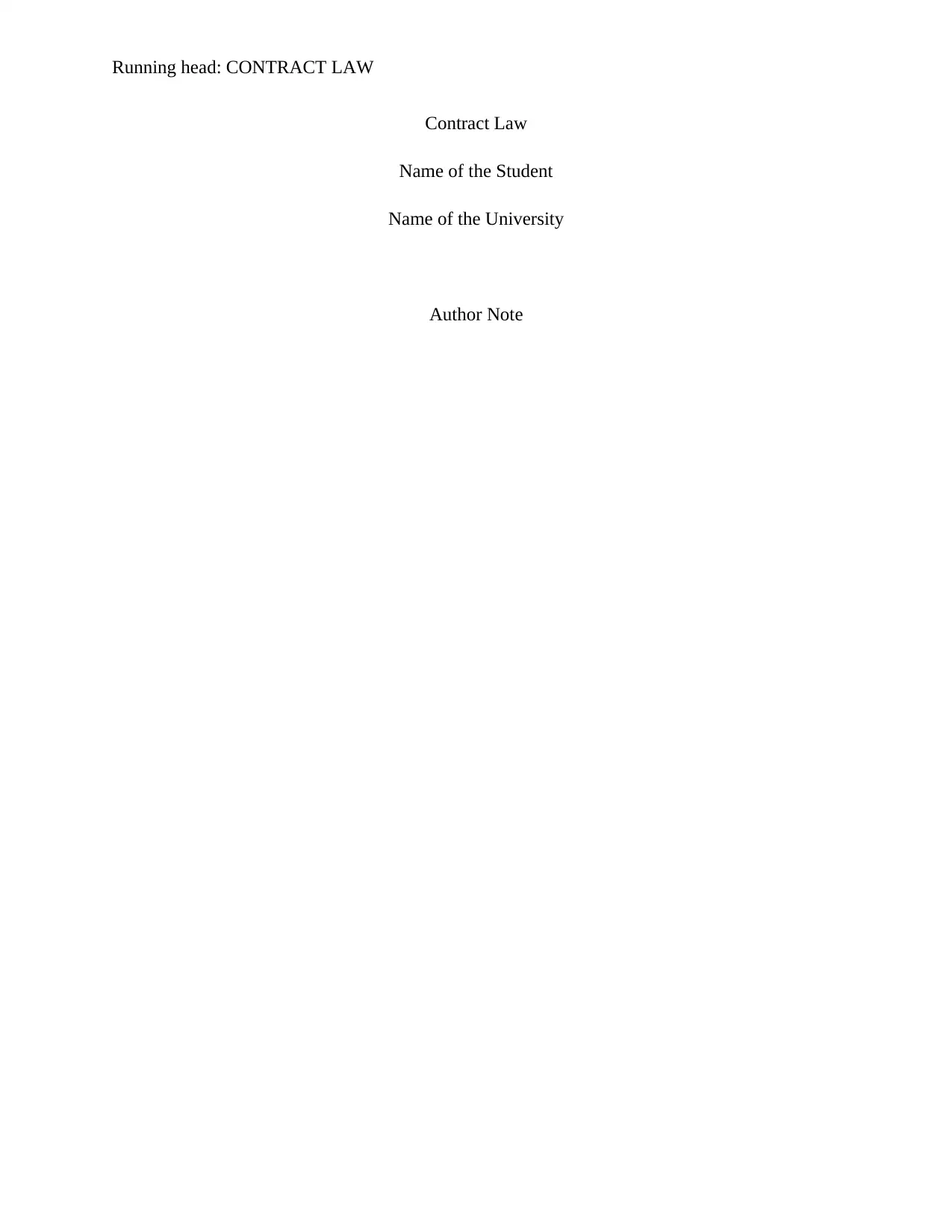
Running head: CONTRACT LAW
Contract Law
Name of the Student
Name of the University
Author Note
Contract Law
Name of the Student
Name of the University
Author Note
Paraphrase This Document
Need a fresh take? Get an instant paraphrase of this document with our AI Paraphraser
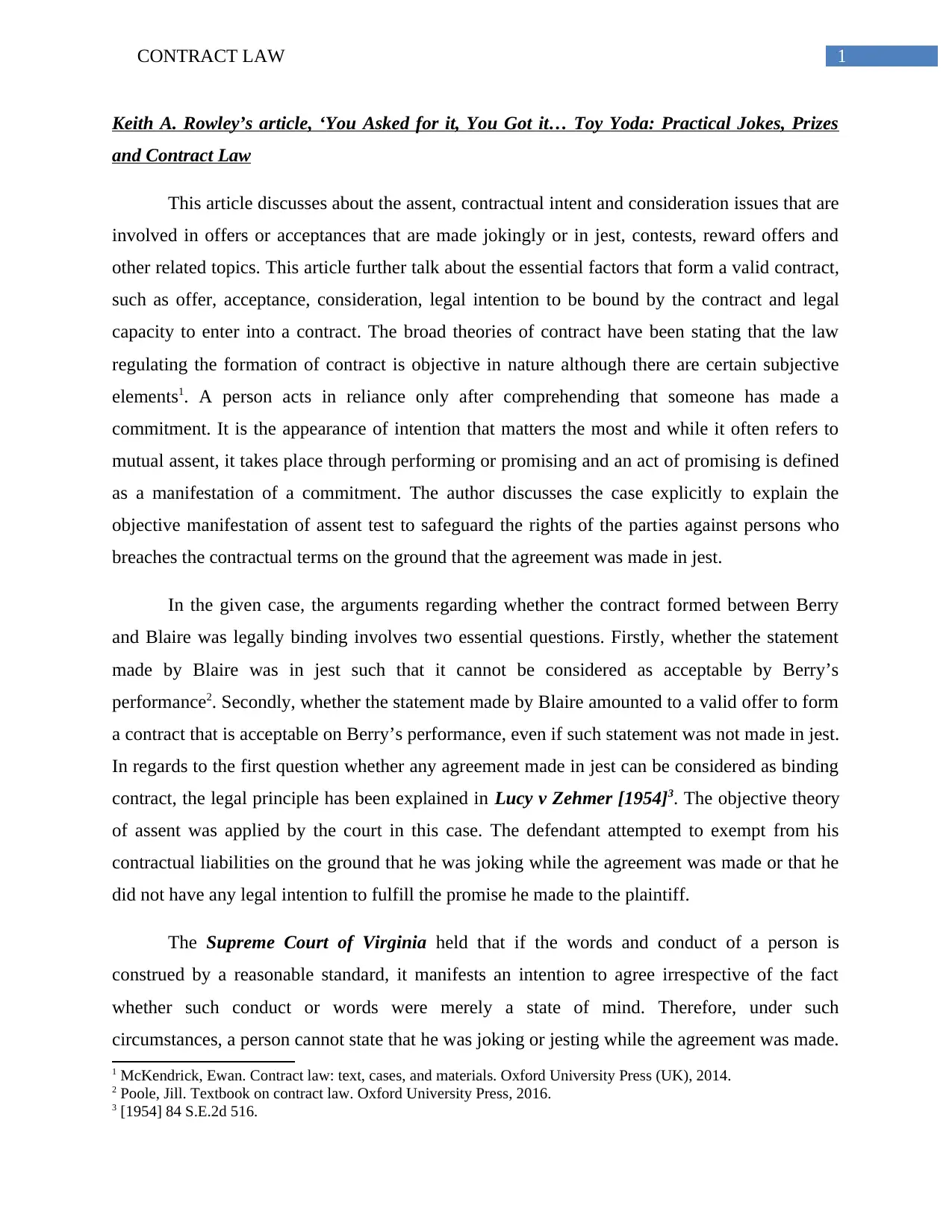
1CONTRACT LAW
Keith A. Rowley’s article, ‘You Asked for it, You Got it… Toy Yoda: Practical Jokes, Prizes
and Contract Law
This article discusses about the assent, contractual intent and consideration issues that are
involved in offers or acceptances that are made jokingly or in jest, contests, reward offers and
other related topics. This article further talk about the essential factors that form a valid contract,
such as offer, acceptance, consideration, legal intention to be bound by the contract and legal
capacity to enter into a contract. The broad theories of contract have been stating that the law
regulating the formation of contract is objective in nature although there are certain subjective
elements1. A person acts in reliance only after comprehending that someone has made a
commitment. It is the appearance of intention that matters the most and while it often refers to
mutual assent, it takes place through performing or promising and an act of promising is defined
as a manifestation of a commitment. The author discusses the case explicitly to explain the
objective manifestation of assent test to safeguard the rights of the parties against persons who
breaches the contractual terms on the ground that the agreement was made in jest.
In the given case, the arguments regarding whether the contract formed between Berry
and Blaire was legally binding involves two essential questions. Firstly, whether the statement
made by Blaire was in jest such that it cannot be considered as acceptable by Berry’s
performance2. Secondly, whether the statement made by Blaire amounted to a valid offer to form
a contract that is acceptable on Berry’s performance, even if such statement was not made in jest.
In regards to the first question whether any agreement made in jest can be considered as binding
contract, the legal principle has been explained in Lucy v Zehmer [1954]3. The objective theory
of assent was applied by the court in this case. The defendant attempted to exempt from his
contractual liabilities on the ground that he was joking while the agreement was made or that he
did not have any legal intention to fulfill the promise he made to the plaintiff.
The Supreme Court of Virginia held that if the words and conduct of a person is
construed by a reasonable standard, it manifests an intention to agree irrespective of the fact
whether such conduct or words were merely a state of mind. Therefore, under such
circumstances, a person cannot state that he was joking or jesting while the agreement was made.
1 McKendrick, Ewan. Contract law: text, cases, and materials. Oxford University Press (UK), 2014.
2 Poole, Jill. Textbook on contract law. Oxford University Press, 2016.
3 [1954] 84 S.E.2d 516.
Keith A. Rowley’s article, ‘You Asked for it, You Got it… Toy Yoda: Practical Jokes, Prizes
and Contract Law
This article discusses about the assent, contractual intent and consideration issues that are
involved in offers or acceptances that are made jokingly or in jest, contests, reward offers and
other related topics. This article further talk about the essential factors that form a valid contract,
such as offer, acceptance, consideration, legal intention to be bound by the contract and legal
capacity to enter into a contract. The broad theories of contract have been stating that the law
regulating the formation of contract is objective in nature although there are certain subjective
elements1. A person acts in reliance only after comprehending that someone has made a
commitment. It is the appearance of intention that matters the most and while it often refers to
mutual assent, it takes place through performing or promising and an act of promising is defined
as a manifestation of a commitment. The author discusses the case explicitly to explain the
objective manifestation of assent test to safeguard the rights of the parties against persons who
breaches the contractual terms on the ground that the agreement was made in jest.
In the given case, the arguments regarding whether the contract formed between Berry
and Blaire was legally binding involves two essential questions. Firstly, whether the statement
made by Blaire was in jest such that it cannot be considered as acceptable by Berry’s
performance2. Secondly, whether the statement made by Blaire amounted to a valid offer to form
a contract that is acceptable on Berry’s performance, even if such statement was not made in jest.
In regards to the first question whether any agreement made in jest can be considered as binding
contract, the legal principle has been explained in Lucy v Zehmer [1954]3. The objective theory
of assent was applied by the court in this case. The defendant attempted to exempt from his
contractual liabilities on the ground that he was joking while the agreement was made or that he
did not have any legal intention to fulfill the promise he made to the plaintiff.
The Supreme Court of Virginia held that if the words and conduct of a person is
construed by a reasonable standard, it manifests an intention to agree irrespective of the fact
whether such conduct or words were merely a state of mind. Therefore, under such
circumstances, a person cannot state that he was joking or jesting while the agreement was made.
1 McKendrick, Ewan. Contract law: text, cases, and materials. Oxford University Press (UK), 2014.
2 Poole, Jill. Textbook on contract law. Oxford University Press, 2016.
3 [1954] 84 S.E.2d 516.
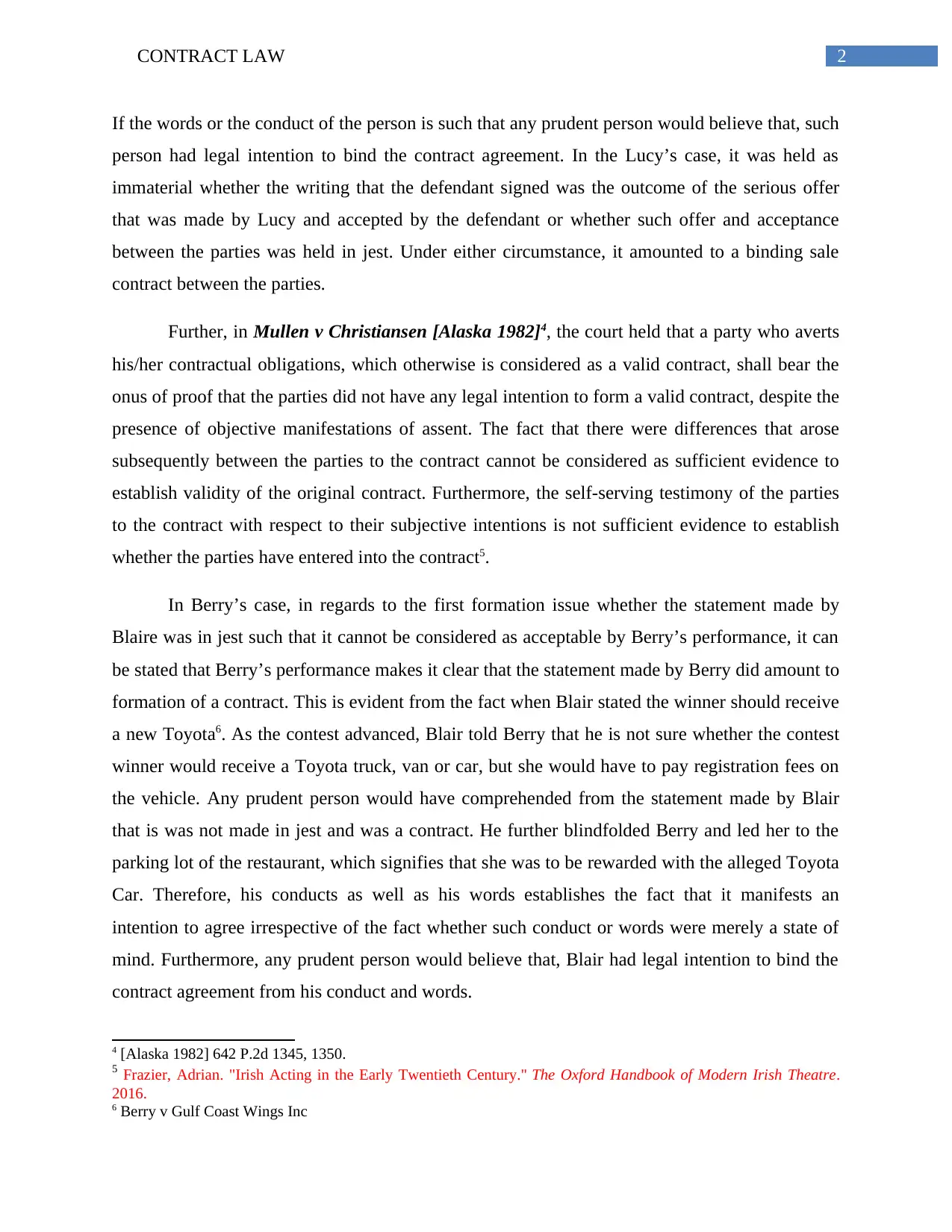
2CONTRACT LAW
If the words or the conduct of the person is such that any prudent person would believe that, such
person had legal intention to bind the contract agreement. In the Lucy’s case, it was held as
immaterial whether the writing that the defendant signed was the outcome of the serious offer
that was made by Lucy and accepted by the defendant or whether such offer and acceptance
between the parties was held in jest. Under either circumstance, it amounted to a binding sale
contract between the parties.
Further, in Mullen v Christiansen [Alaska 1982]4, the court held that a party who averts
his/her contractual obligations, which otherwise is considered as a valid contract, shall bear the
onus of proof that the parties did not have any legal intention to form a valid contract, despite the
presence of objective manifestations of assent. The fact that there were differences that arose
subsequently between the parties to the contract cannot be considered as sufficient evidence to
establish validity of the original contract. Furthermore, the self-serving testimony of the parties
to the contract with respect to their subjective intentions is not sufficient evidence to establish
whether the parties have entered into the contract5.
In Berry’s case, in regards to the first formation issue whether the statement made by
Blaire was in jest such that it cannot be considered as acceptable by Berry’s performance, it can
be stated that Berry’s performance makes it clear that the statement made by Berry did amount to
formation of a contract. This is evident from the fact when Blair stated the winner should receive
a new Toyota6. As the contest advanced, Blair told Berry that he is not sure whether the contest
winner would receive a Toyota truck, van or car, but she would have to pay registration fees on
the vehicle. Any prudent person would have comprehended from the statement made by Blair
that is was not made in jest and was a contract. He further blindfolded Berry and led her to the
parking lot of the restaurant, which signifies that she was to be rewarded with the alleged Toyota
Car. Therefore, his conducts as well as his words establishes the fact that it manifests an
intention to agree irrespective of the fact whether such conduct or words were merely a state of
mind. Furthermore, any prudent person would believe that, Blair had legal intention to bind the
contract agreement from his conduct and words.
4 [Alaska 1982] 642 P.2d 1345, 1350.
5 Frazier, Adrian. "Irish Acting in the Early Twentieth Century." The Oxford Handbook of Modern Irish Theatre.
2016.
6 Berry v Gulf Coast Wings Inc
If the words or the conduct of the person is such that any prudent person would believe that, such
person had legal intention to bind the contract agreement. In the Lucy’s case, it was held as
immaterial whether the writing that the defendant signed was the outcome of the serious offer
that was made by Lucy and accepted by the defendant or whether such offer and acceptance
between the parties was held in jest. Under either circumstance, it amounted to a binding sale
contract between the parties.
Further, in Mullen v Christiansen [Alaska 1982]4, the court held that a party who averts
his/her contractual obligations, which otherwise is considered as a valid contract, shall bear the
onus of proof that the parties did not have any legal intention to form a valid contract, despite the
presence of objective manifestations of assent. The fact that there were differences that arose
subsequently between the parties to the contract cannot be considered as sufficient evidence to
establish validity of the original contract. Furthermore, the self-serving testimony of the parties
to the contract with respect to their subjective intentions is not sufficient evidence to establish
whether the parties have entered into the contract5.
In Berry’s case, in regards to the first formation issue whether the statement made by
Blaire was in jest such that it cannot be considered as acceptable by Berry’s performance, it can
be stated that Berry’s performance makes it clear that the statement made by Berry did amount to
formation of a contract. This is evident from the fact when Blair stated the winner should receive
a new Toyota6. As the contest advanced, Blair told Berry that he is not sure whether the contest
winner would receive a Toyota truck, van or car, but she would have to pay registration fees on
the vehicle. Any prudent person would have comprehended from the statement made by Blair
that is was not made in jest and was a contract. He further blindfolded Berry and led her to the
parking lot of the restaurant, which signifies that she was to be rewarded with the alleged Toyota
Car. Therefore, his conducts as well as his words establishes the fact that it manifests an
intention to agree irrespective of the fact whether such conduct or words were merely a state of
mind. Furthermore, any prudent person would believe that, Blair had legal intention to bind the
contract agreement from his conduct and words.
4 [Alaska 1982] 642 P.2d 1345, 1350.
5 Frazier, Adrian. "Irish Acting in the Early Twentieth Century." The Oxford Handbook of Modern Irish Theatre.
2016.
6 Berry v Gulf Coast Wings Inc
⊘ This is a preview!⊘
Do you want full access?
Subscribe today to unlock all pages.

Trusted by 1+ million students worldwide
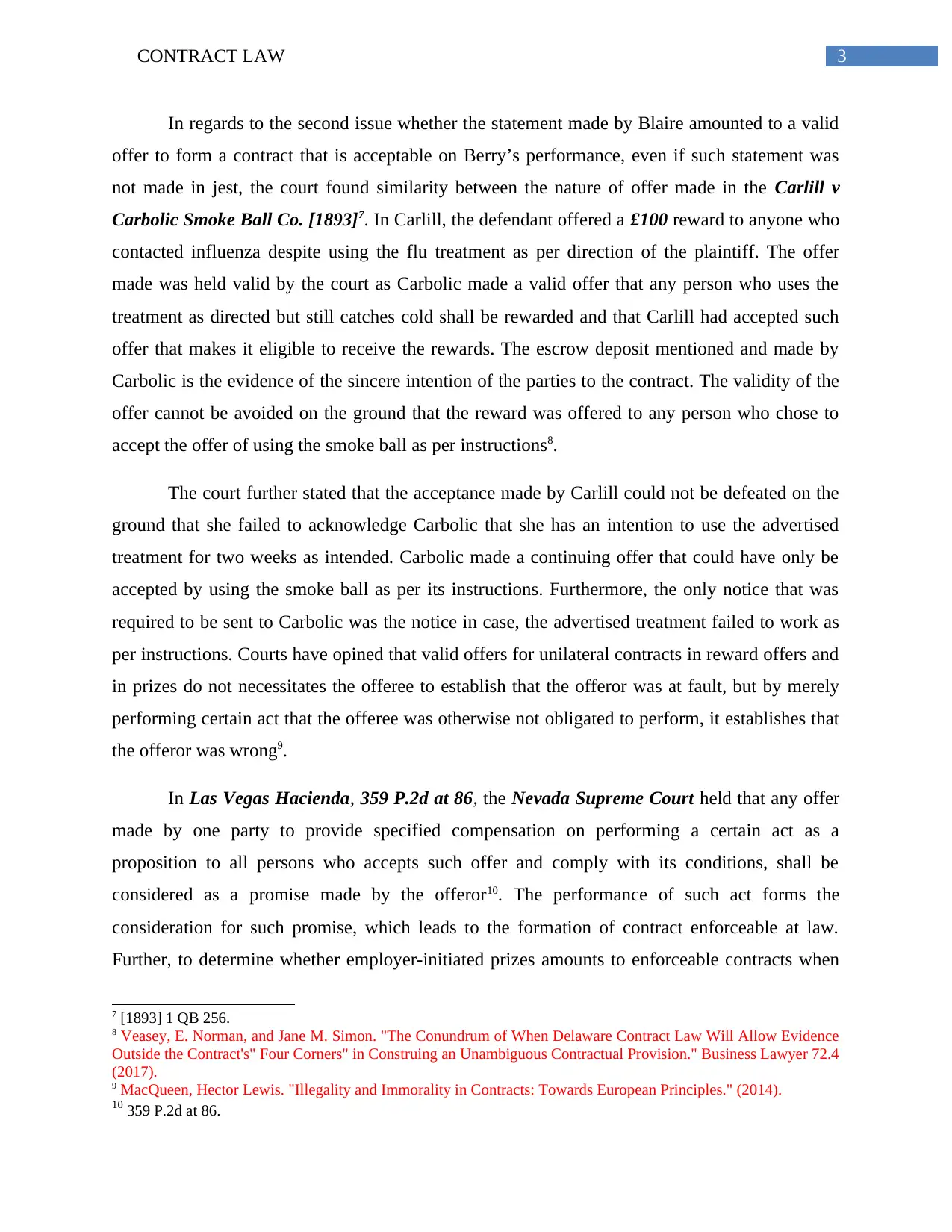
3CONTRACT LAW
In regards to the second issue whether the statement made by Blaire amounted to a valid
offer to form a contract that is acceptable on Berry’s performance, even if such statement was
not made in jest, the court found similarity between the nature of offer made in the Carlill v
Carbolic Smoke Ball Co. [1893]7. In Carlill, the defendant offered a £100 reward to anyone who
contacted influenza despite using the flu treatment as per direction of the plaintiff. The offer
made was held valid by the court as Carbolic made a valid offer that any person who uses the
treatment as directed but still catches cold shall be rewarded and that Carlill had accepted such
offer that makes it eligible to receive the rewards. The escrow deposit mentioned and made by
Carbolic is the evidence of the sincere intention of the parties to the contract. The validity of the
offer cannot be avoided on the ground that the reward was offered to any person who chose to
accept the offer of using the smoke ball as per instructions8.
The court further stated that the acceptance made by Carlill could not be defeated on the
ground that she failed to acknowledge Carbolic that she has an intention to use the advertised
treatment for two weeks as intended. Carbolic made a continuing offer that could have only be
accepted by using the smoke ball as per its instructions. Furthermore, the only notice that was
required to be sent to Carbolic was the notice in case, the advertised treatment failed to work as
per instructions. Courts have opined that valid offers for unilateral contracts in reward offers and
in prizes do not necessitates the offeree to establish that the offeror was at fault, but by merely
performing certain act that the offeree was otherwise not obligated to perform, it establishes that
the offeror was wrong9.
In Las Vegas Hacienda, 359 P.2d at 86, the Nevada Supreme Court held that any offer
made by one party to provide specified compensation on performing a certain act as a
proposition to all persons who accepts such offer and comply with its conditions, shall be
considered as a promise made by the offeror10. The performance of such act forms the
consideration for such promise, which leads to the formation of contract enforceable at law.
Further, to determine whether employer-initiated prizes amounts to enforceable contracts when
7 [1893] 1 QB 256.
8 Veasey, E. Norman, and Jane M. Simon. "The Conundrum of When Delaware Contract Law Will Allow Evidence
Outside the Contract's" Four Corners" in Construing an Unambiguous Contractual Provision." Business Lawyer 72.4
(2017).
9 MacQueen, Hector Lewis. "Illegality and Immorality in Contracts: Towards European Principles." (2014).
10 359 P.2d at 86.
In regards to the second issue whether the statement made by Blaire amounted to a valid
offer to form a contract that is acceptable on Berry’s performance, even if such statement was
not made in jest, the court found similarity between the nature of offer made in the Carlill v
Carbolic Smoke Ball Co. [1893]7. In Carlill, the defendant offered a £100 reward to anyone who
contacted influenza despite using the flu treatment as per direction of the plaintiff. The offer
made was held valid by the court as Carbolic made a valid offer that any person who uses the
treatment as directed but still catches cold shall be rewarded and that Carlill had accepted such
offer that makes it eligible to receive the rewards. The escrow deposit mentioned and made by
Carbolic is the evidence of the sincere intention of the parties to the contract. The validity of the
offer cannot be avoided on the ground that the reward was offered to any person who chose to
accept the offer of using the smoke ball as per instructions8.
The court further stated that the acceptance made by Carlill could not be defeated on the
ground that she failed to acknowledge Carbolic that she has an intention to use the advertised
treatment for two weeks as intended. Carbolic made a continuing offer that could have only be
accepted by using the smoke ball as per its instructions. Furthermore, the only notice that was
required to be sent to Carbolic was the notice in case, the advertised treatment failed to work as
per instructions. Courts have opined that valid offers for unilateral contracts in reward offers and
in prizes do not necessitates the offeree to establish that the offeror was at fault, but by merely
performing certain act that the offeree was otherwise not obligated to perform, it establishes that
the offeror was wrong9.
In Las Vegas Hacienda, 359 P.2d at 86, the Nevada Supreme Court held that any offer
made by one party to provide specified compensation on performing a certain act as a
proposition to all persons who accepts such offer and comply with its conditions, shall be
considered as a promise made by the offeror10. The performance of such act forms the
consideration for such promise, which leads to the formation of contract enforceable at law.
Further, to determine whether employer-initiated prizes amounts to enforceable contracts when
7 [1893] 1 QB 256.
8 Veasey, E. Norman, and Jane M. Simon. "The Conundrum of When Delaware Contract Law Will Allow Evidence
Outside the Contract's" Four Corners" in Construing an Unambiguous Contractual Provision." Business Lawyer 72.4
(2017).
9 MacQueen, Hector Lewis. "Illegality and Immorality in Contracts: Towards European Principles." (2014).
10 359 P.2d at 86.
Paraphrase This Document
Need a fresh take? Get an instant paraphrase of this document with our AI Paraphraser
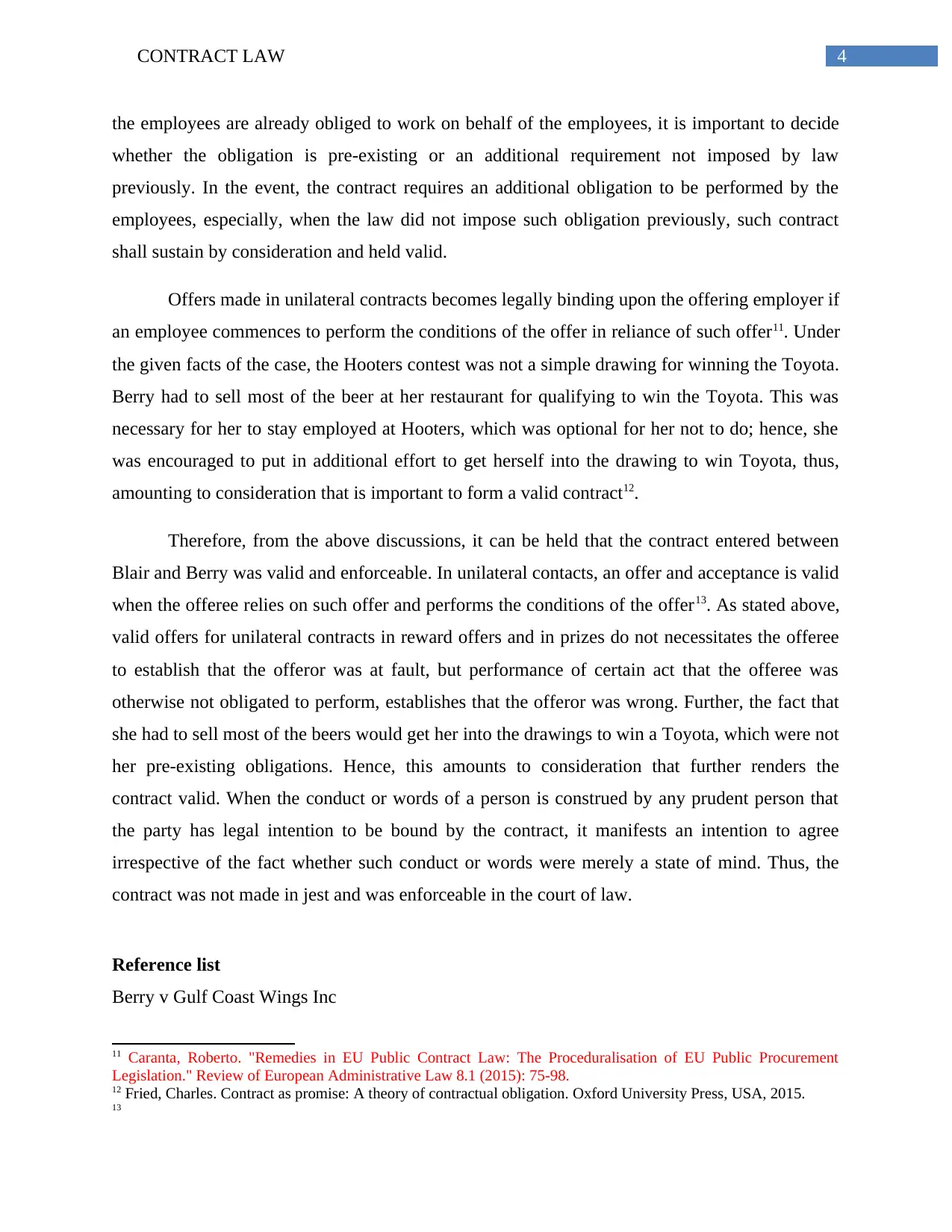
4CONTRACT LAW
the employees are already obliged to work on behalf of the employees, it is important to decide
whether the obligation is pre-existing or an additional requirement not imposed by law
previously. In the event, the contract requires an additional obligation to be performed by the
employees, especially, when the law did not impose such obligation previously, such contract
shall sustain by consideration and held valid.
Offers made in unilateral contracts becomes legally binding upon the offering employer if
an employee commences to perform the conditions of the offer in reliance of such offer11. Under
the given facts of the case, the Hooters contest was not a simple drawing for winning the Toyota.
Berry had to sell most of the beer at her restaurant for qualifying to win the Toyota. This was
necessary for her to stay employed at Hooters, which was optional for her not to do; hence, she
was encouraged to put in additional effort to get herself into the drawing to win Toyota, thus,
amounting to consideration that is important to form a valid contract12.
Therefore, from the above discussions, it can be held that the contract entered between
Blair and Berry was valid and enforceable. In unilateral contacts, an offer and acceptance is valid
when the offeree relies on such offer and performs the conditions of the offer13. As stated above,
valid offers for unilateral contracts in reward offers and in prizes do not necessitates the offeree
to establish that the offeror was at fault, but performance of certain act that the offeree was
otherwise not obligated to perform, establishes that the offeror was wrong. Further, the fact that
she had to sell most of the beers would get her into the drawings to win a Toyota, which were not
her pre-existing obligations. Hence, this amounts to consideration that further renders the
contract valid. When the conduct or words of a person is construed by any prudent person that
the party has legal intention to be bound by the contract, it manifests an intention to agree
irrespective of the fact whether such conduct or words were merely a state of mind. Thus, the
contract was not made in jest and was enforceable in the court of law.
Reference list
Berry v Gulf Coast Wings Inc
11 Caranta, Roberto. "Remedies in EU Public Contract Law: The Proceduralisation of EU Public Procurement
Legislation." Review of European Administrative Law 8.1 (2015): 75-98.
12 Fried, Charles. Contract as promise: A theory of contractual obligation. Oxford University Press, USA, 2015.
13
the employees are already obliged to work on behalf of the employees, it is important to decide
whether the obligation is pre-existing or an additional requirement not imposed by law
previously. In the event, the contract requires an additional obligation to be performed by the
employees, especially, when the law did not impose such obligation previously, such contract
shall sustain by consideration and held valid.
Offers made in unilateral contracts becomes legally binding upon the offering employer if
an employee commences to perform the conditions of the offer in reliance of such offer11. Under
the given facts of the case, the Hooters contest was not a simple drawing for winning the Toyota.
Berry had to sell most of the beer at her restaurant for qualifying to win the Toyota. This was
necessary for her to stay employed at Hooters, which was optional for her not to do; hence, she
was encouraged to put in additional effort to get herself into the drawing to win Toyota, thus,
amounting to consideration that is important to form a valid contract12.
Therefore, from the above discussions, it can be held that the contract entered between
Blair and Berry was valid and enforceable. In unilateral contacts, an offer and acceptance is valid
when the offeree relies on such offer and performs the conditions of the offer13. As stated above,
valid offers for unilateral contracts in reward offers and in prizes do not necessitates the offeree
to establish that the offeror was at fault, but performance of certain act that the offeree was
otherwise not obligated to perform, establishes that the offeror was wrong. Further, the fact that
she had to sell most of the beers would get her into the drawings to win a Toyota, which were not
her pre-existing obligations. Hence, this amounts to consideration that further renders the
contract valid. When the conduct or words of a person is construed by any prudent person that
the party has legal intention to be bound by the contract, it manifests an intention to agree
irrespective of the fact whether such conduct or words were merely a state of mind. Thus, the
contract was not made in jest and was enforceable in the court of law.
Reference list
Berry v Gulf Coast Wings Inc
11 Caranta, Roberto. "Remedies in EU Public Contract Law: The Proceduralisation of EU Public Procurement
Legislation." Review of European Administrative Law 8.1 (2015): 75-98.
12 Fried, Charles. Contract as promise: A theory of contractual obligation. Oxford University Press, USA, 2015.
13
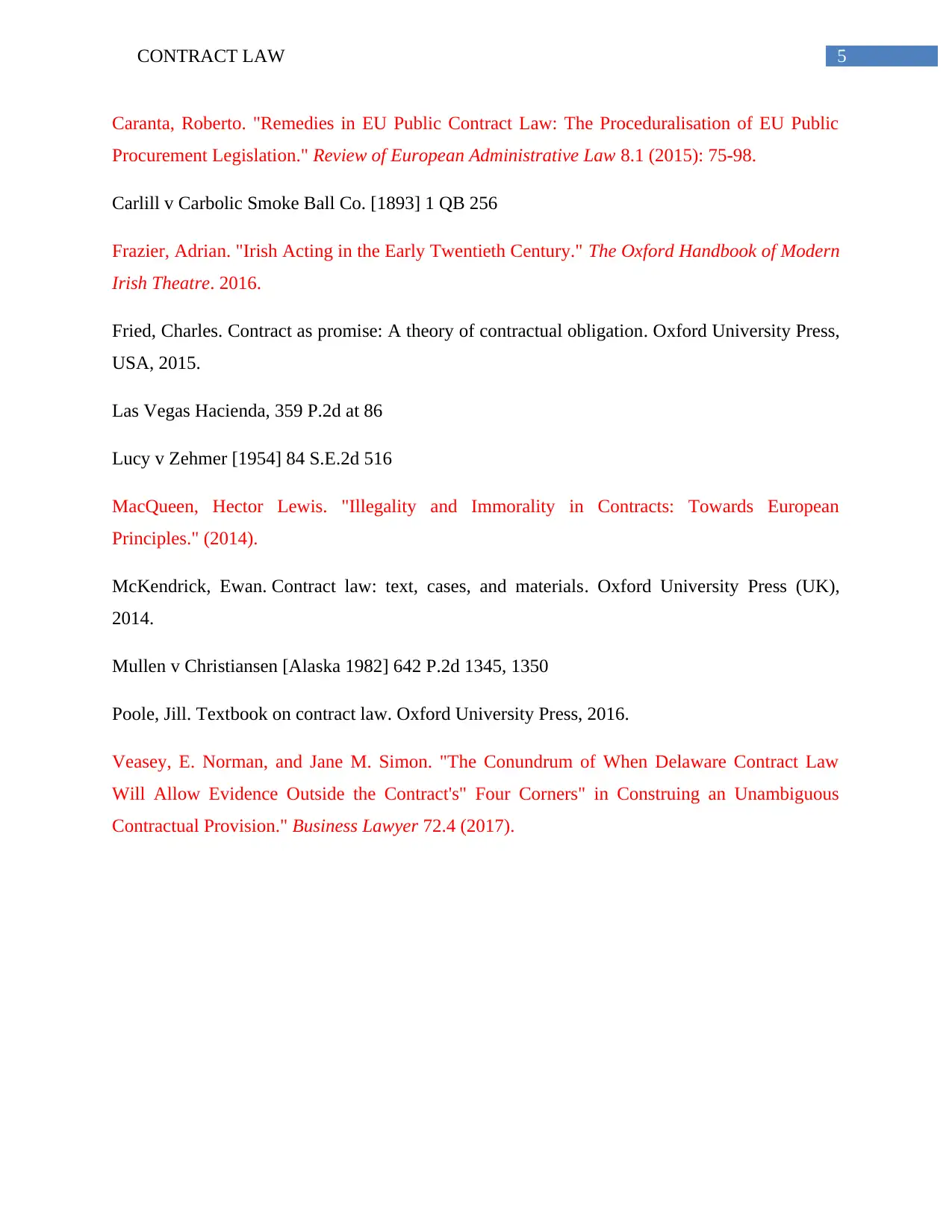
5CONTRACT LAW
Caranta, Roberto. "Remedies in EU Public Contract Law: The Proceduralisation of EU Public
Procurement Legislation." Review of European Administrative Law 8.1 (2015): 75-98.
Carlill v Carbolic Smoke Ball Co. [1893] 1 QB 256
Frazier, Adrian. "Irish Acting in the Early Twentieth Century." The Oxford Handbook of Modern
Irish Theatre. 2016.
Fried, Charles. Contract as promise: A theory of contractual obligation. Oxford University Press,
USA, 2015.
Las Vegas Hacienda, 359 P.2d at 86
Lucy v Zehmer [1954] 84 S.E.2d 516
MacQueen, Hector Lewis. "Illegality and Immorality in Contracts: Towards European
Principles." (2014).
McKendrick, Ewan. Contract law: text, cases, and materials. Oxford University Press (UK),
2014.
Mullen v Christiansen [Alaska 1982] 642 P.2d 1345, 1350
Poole, Jill. Textbook on contract law. Oxford University Press, 2016.
Veasey, E. Norman, and Jane M. Simon. "The Conundrum of When Delaware Contract Law
Will Allow Evidence Outside the Contract's" Four Corners" in Construing an Unambiguous
Contractual Provision." Business Lawyer 72.4 (2017).
Caranta, Roberto. "Remedies in EU Public Contract Law: The Proceduralisation of EU Public
Procurement Legislation." Review of European Administrative Law 8.1 (2015): 75-98.
Carlill v Carbolic Smoke Ball Co. [1893] 1 QB 256
Frazier, Adrian. "Irish Acting in the Early Twentieth Century." The Oxford Handbook of Modern
Irish Theatre. 2016.
Fried, Charles. Contract as promise: A theory of contractual obligation. Oxford University Press,
USA, 2015.
Las Vegas Hacienda, 359 P.2d at 86
Lucy v Zehmer [1954] 84 S.E.2d 516
MacQueen, Hector Lewis. "Illegality and Immorality in Contracts: Towards European
Principles." (2014).
McKendrick, Ewan. Contract law: text, cases, and materials. Oxford University Press (UK),
2014.
Mullen v Christiansen [Alaska 1982] 642 P.2d 1345, 1350
Poole, Jill. Textbook on contract law. Oxford University Press, 2016.
Veasey, E. Norman, and Jane M. Simon. "The Conundrum of When Delaware Contract Law
Will Allow Evidence Outside the Contract's" Four Corners" in Construing an Unambiguous
Contractual Provision." Business Lawyer 72.4 (2017).
⊘ This is a preview!⊘
Do you want full access?
Subscribe today to unlock all pages.

Trusted by 1+ million students worldwide
1 out of 6
Related Documents
Your All-in-One AI-Powered Toolkit for Academic Success.
+13062052269
info@desklib.com
Available 24*7 on WhatsApp / Email
![[object Object]](/_next/static/media/star-bottom.7253800d.svg)
Unlock your academic potential
Copyright © 2020–2026 A2Z Services. All Rights Reserved. Developed and managed by ZUCOL.





